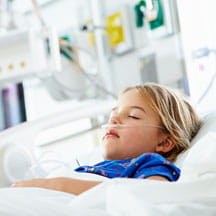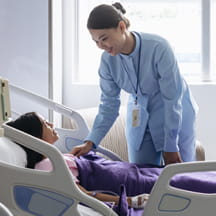Emergency Department (ED) clinicians see a wide array of conditions, from acute to critical care, and care for a diverse pediatric patient population. With this education product list, ED staff can develop the skills necessary for pediatric ED care. These evidence-based courses are relevant for any hospital that wants to improve assessment and treatment for pediatric patients.
Emergency Department Courses
Advanced Medication Calculation
Age-Specific Care for Adolescents
Age-Specific Care for Adults
Age-Specific Care for Infants
Age-Specific Care for Newborns
Age-Specific Care for Preschoolers
Age-Specific Care for School-Age Children
Age-Specific Care for Toddlers
Arrhythmia Assessment- Common Pediatric Rhythms
Arrhythmia Recognition & Care Management Series
Arrhythmia Recognition: Analyzing the ECG Rhythm Strip
Arrhythmia Recognition: Just the Basics for the Pediatric Clinician
Arrhythmia Recognition: Lines, Waves and Segments
Arrhythmia Recognition: Sinus
Arrhythmia Recognition: Structure and Function of the Heart
Arrhythmia Recognition: The Cardiac Monitor
Assessment of the Critically Ill Child
Asthma
Basic Medication Calculation
Blood and Blood Components
Blood Components
Blood Transfusion Reaction
Care of the Pediatric Patient With Suicidal Ideation
CHD: An Overview
CHD: Increased Pulmonary Blood Flow
CHD: Decreased Pulmonary Blood Flow
CHD: Decreased Systemic Blood Flow
Child Abuse and Neglect
Clinical Delegation
Crisis Prevention Through Verbal and Nonverbal De-escalation Strategies
EMTALA Overview
Family-Centered Care in the ICU
Fluids and Electrolyte Management: Dehydration
Fluids and Electrolyte Management: Laboratory Assessment
Fluids and Electrolyte Management: Physical Assessment
Fluids and Electrolyte Management: Physiological Differences
Health Care Advance Directives: Communicating Wishes
Healthcare Emergency Management
High-Alert Medications
HIPAA Overview
Implementing Trauma-Informed Sensitive Practice
Intimate Partner Violence
Introduction to Ethics
Introduction to Pediatric Pressure Injuries
Management of MDROs in the Health Care Setting (Clinical)
Management of Peripheral IV Complications in the Pediatric Patient
Medication Error Reduction
Neonatal Pain Assessment and Management
Pain Management: Assessment of Pain
Pain Management: Non-Pharmacological Therapies in the Management of Pediatric Pain
Pain Management: Pain Pathophysiology
Pain Management: Pain Technologies – PCA & Epidural Analgesia (Optional)
Pain Management: Pharmacological Management of Pediatric Pain
Pediatric Assessment: Performing a Head-to-Toe Assessment
Pediatric Assessment: The Cardiovascular System
Pediatric Assessment: The Gastrointestinal System
Pediatric Assessment: The Genitourinary System
Pediatric Assessment: The Integumentary System
Pediatric Assessment: The Musculoskeletal System
Pediatric Assessment: The Neurological System
Pediatric Assessment: The Respiratory System
Pediatric Peripheral IV Care & Management
Pediatric Restraint and Seclusion
Pressure Injuries in the Pediatric Population: Staging and Care
Pressure Injury Staging Assessment
Preventing Central Line-Associated Bloodstream Infections
Procedural Sedation in the Pediatric Patient
Radiation Safety
Status Asthmaticus
Therapeutic Relationships and Professional Behavior
Thermoregulation of the Newborn
Trauma-Informed Practice: Concepts, Goals and Key Principles
Vicarious Trauma and Self-Care






